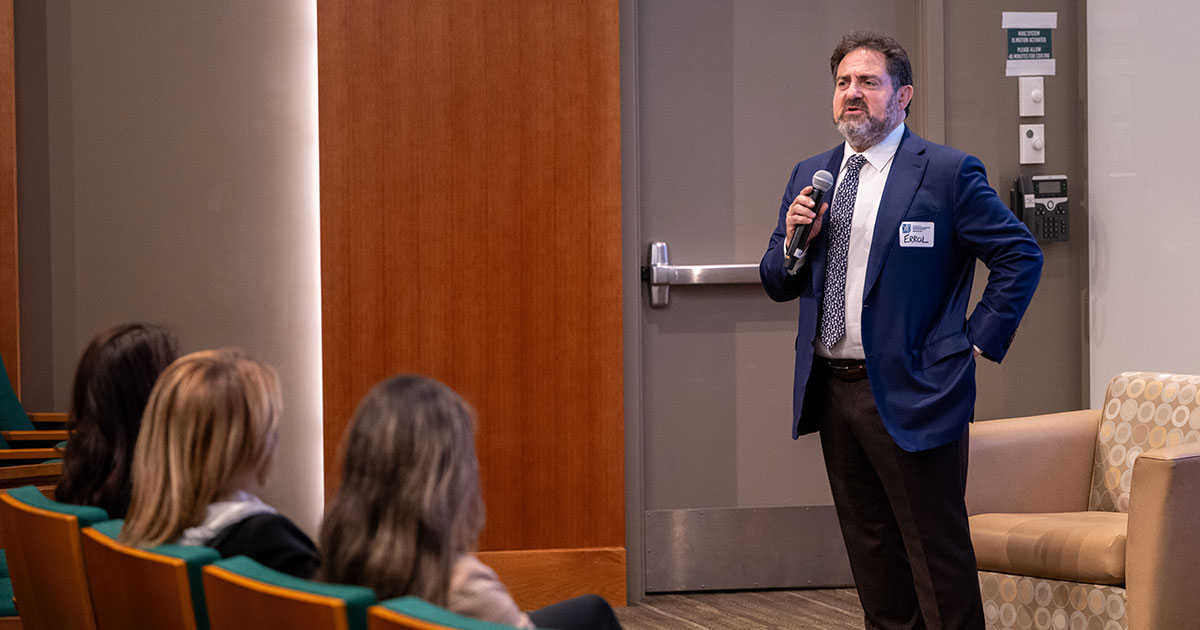Launching a Startup? Avoid These 3 Common Legal Mistakes

More than 25 million Americans started or ran new businesses in 2016. Among those millions: plenty of first-time founders navigating a brand-new startup landscape.
In the excitement of finally launching a venture, legal questions and concerns may be at the back of a founder’s mind. But, they shouldn’t be, says Jack Steele, a lawyer at Pierce Atwood LLP who frequently works with new businesses. To avoid battles down the road—and make seeking funding, or eventually selling the company easier—legal issues should be top of mind from the start.
In a session with student founders through Babson College’s Arthur M. Blank Center for Entrepreneurship, Steele shared a list of some of the most common legal mistakes—and how to avoid them. He was joined by Joanna Geisinger, founder and CEO of TORq Interface, who shared her experience navigating legal waters with her ventures.
While the advice outlined below is a good jumping off point, don’t overlook the importance of seeking counsel from an experienced startup law expert early in the process.
Failing to Iron Out Equity Agreements
So, you founded a business with your friends. Great! Before you rush to get it up and running, ask yourself: How will you divide equity? What happens if one of your co-founders leaves after one year?
These are important questions to iron out at the beginning; when they’re left unanswered, startups find themselves in trouble. “If there are four co-founders, there is a very small chance all of them will be together after two or three years,” said Steele. “This is an issue with any new startup, but we see it a lot with students.”
Have the equity conversation from the start to determine how it will be divided among the founding team. These conversations might be awkward—especially if you ultimately don’t divide equity equally—but they’re important. And, the conversation shouldn’t end there.
“Let’s say four co-founders agree on 25 percent equity, then one leaves,” advised Steele. “Some ask how they can take that equity back. Basically, they can’t, unless they did something about it at the beginning.”
Here’s where vesting comes in. Under a standard, four-year vesting schedule with a one-year cliff, founders vest their shares during the four-year period. The cliff means founders won’t be vested any equity until they’ve been at the company for one year.
Though she has no co-founders, Geisinger utilizes the four-year vesting schedule for her company, and maintains the majority share in TORq. “I’m grateful that I have control over the company, and the ability to make decisions.”
Sacrificing Decision-Making Power in Exchange Capital
Speaking of decisions, here’s some food for thought: Does your capital come with strings?
It’s common for new ventures to seek outside funding, but not all money is created equal. Steele advises founders to consider the source, and think through the implications associated with where the money is coming from.
For example: Taking money from a strategic business partner may seem like a wise choice, but there may be expectations associated with that capital. “We’ve seen situations where the string is exclusivity, or a right of first refusal on a sale,” said Steele. “This can make it difficult to move expand your market, or eventually sell the company.”
Geisinger recommends making relationships with these strategic partners early on, but waiting until your venture is more established to seek their funding—a policy she has maintained when leading her business. “At the end of the day, I want to have a say in the direction my company goes,” she said. “Until you’re someone big, too, keep the big names out of your company.”
Crowdfunding might not be the way to go, either. Startups accepting crowdfunding might find it difficult to attract venture capital funding later on. Plus, keeping track of (and keeping happy) the high number of investors who typically participate in crowdfunded campaigns is a lot for a new business to manage.
Not Protecting Intellectual Property
Intellectual property is the ownership of ideas. Per Entrepreneur, “Unlike tangible assets to your business such as computers or your office, intellectual property is a collection of ideas and concepts.”
Protecting your IP can make your business more attractive to future investors, and prevent competitors from stealing your idea. Your business is built on your idea—but do you own it? When working with a tech firm while simultaneously developing TORq Interface, Geisinger made sure her contract explicitly stated she owned her IP.
The waters get muddy if you’ve worked on the idea while employed elsewhere. If you’ve signed a Confidentiality and Invention Assignment Agreement (CIAA), any work you’ve done or ideas you’ve developed as an employee related to the business of your employer are fully owned by your employer. The takeaway: don’t develop your idea on company time.
Consider having your employees sign CIAAs, too, so they don’t own the ideas they develop while under your employment. Consultants and contractors should sign IP agreements, too. And, don’t overlook filing for IP protection—a patent, copyright, trademark, etc.
Posted in Insights



